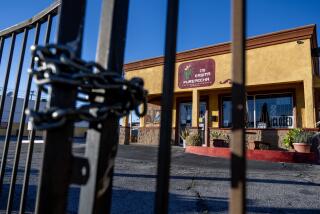Making his point, at 80 mph
The head of one of America’s most famous companies was barreling down a suburban thoroughfare at 80 mph, with no hands on the wheel and a U-Haul trailer in tow.
“There’s no magic to this,” Edward J. “Joe” Shoen, chairman of U-Haul International Inc., told stunned passengers in his Lincoln Town Car. “A trailer wants to trail.”
Undaunted by the 118-degree heat, Shoen had set out to show two Times reporters that towing U-Haul equipment is perfectly safe — unless the customer screws up.
The high-speed demonstration was part of a 10-hour tour of U-Haul operations that highlighted the take-charge style of a chief executive who wears his corporate pride on his sleeve.
“Joe’s a tough, no-nonsense, look-you-in-the-eye, stare-you-down kind of guy and [it’s] served him very well in that business,” said Mick Fleming, a Seattle lawyer who has fought Shoen in court.
Shoen had a wild ride to the top.
His father, L.S. Shoen, started U-Haul in 1945 with a $5,000 loan and a vision of a country suddenly bursting with mobility. Beginning with a single trailer, L.S. added truck rentals in 1959 and built U-Haul into a nationwide brand synonymous with do-it-yourself moving.
A string of marriages produced 13 children. Joe was the third.
L.S. retired as chairman in 1986, setting the stage for a vicious succession battle. Joe prevailed, becoming head of U-Haul and chairman of Amerco, its parent.
But his triumph triggered dozens of lawsuits pitting him and several brothers against their father and other siblings. Ruling in one of the conflicts, a federal appeals court in 1997 described the fracas as “a $1.5-billion family feud that has been waged for longer than World Wars I and II combined.”
The most significant of the lawsuits was sparked by one faction’s attempt to oust Joe. He thwarted the effort in 1988 by arranging the issuance of shares of company stock on favorable terms to five people he deemed “key” employees. They gave their proxies to Joe and his allies, allowing them to vote 50.2% of the shares.
Joe canceled his father’s health and retirement benefits, and blocked efforts by family dissidents to cash in their shares. In 1994, an Arizona jury ordered Amerco to pay the plaintiffs $1.47 billion for their shares and slapped Joe with punitive damages of $70 million for acting with “hatred and ill will” toward his father and siblings.
The judge later reduced the compensation to about $460 million and the punitive damages to $7 million.
Joe’s chief rival was his brother Sam, the oldest child and a favorite of his father. In a macabre chapter of the family saga, Sam’s Norwegian-born wife, Eva, was shot to death in her Telluride, Colo., home in 1990.
L.S. Shoen and son Michael, an attorney, speculated in the media that Joe and another brother, Mark, were involved in the killing, triggering a defamation suit. A suspect later confessed to killing Eva in a botched robbery.
In 1995, a federal court jury cleared L.S. and Michael of the libel charge. A ruling that Joe and Mark Shoen were public figures meant that, to prevail, they had to prove not only that L.S. and Michael made defamatory statements but knew the statements were false.
In 1999, 83-year-old L.S. Shoen rammed his car into a utility pole in Las Vegas and died. The coroner’s office ruled it a suicide.
Though legal sparring continues at a lower level, Joe said he’s put the enmity behind him.
Still, he described his estranged siblings as “people I knew once. We all have people like that . This company made them hundred-millionaires, and they’re out living [lives] of the rich and famous.”
Two of his brothers remain with Amerco. Together, the three own 43.6% of the company’s shares, currently valued at about $700 million.
For Sam Shoen, who has retreated to an idyllic home on Washington’s Olympic Peninsula, hard feelings persist. He described Joe as “very good at manipulating facts.”
Joe, 58, has a law degree and a Harvard MBA and collected $761,000 in compensation from U-Haul in 2006. He said he motivates the company’s 18,000 employees with strategies ranging from “a hug to a kick in the ass, and everything in between.”
He challenged Times reporters last July “to find out the truth” about U-Haul.
Shoen led them from his corporate office to a parking lot, where he attached an uncovered 5-by-8-foot trailer, the kind often used to haul gardening equipment, to his Lincoln.
As he pulled up to a U-Haul maintenance site, one of several stops on the tour, he described U-Haul as a business infused with a social mission.
“We’re a direct descendant of the covered wagons,” Shoen said. “That tradition of seeking a better life goes on . We help people get to a better life.”
During the sweltering odyssey, Shoen, who prides himself on his frugality, broke for lunch at an International House of Pancakes, which serves breakfast all day. He ordered eggs.
Back on the road, he performed his high-speed show and tell on trailer stability.
He had deliberately committed a cardinal sin by stowing a 750-pound concrete block in the back of the trailer. U-Haul tells customers to put 60% of the load in a trailer’s front half to prevent loss of control.
“This trailer won’t tow right,” Shoen said as he gunned the Lincoln along a surface street. When it swings, he said, the disturbance will be violent enough “to turn this car upside down.”
Trailer sway is “caused by misloading,” he said. “There’s no other thing that causes it.”
The trailer began whipping, though not as much as Shoen had predicted. Suddenly, Shoen said, “I want to see if I can reload it.”
He hit the brakes. Bang! The concrete block shot forward, denting the trailer’s front.
“The solution isn’t to change the trailer,” Shoen announced, but “to reposition the load.”
Now, he said triumphantly, “I can drive 140 miles an hour and drink a Coke.” Pushing the Lincoln up to 80 mph and thrusting his hands in the air, he rested his case.
More to Read
Start your day right
Sign up for Essential California for news, features and recommendations from the L.A. Times and beyond in your inbox six days a week.
You may occasionally receive promotional content from the Los Angeles Times.






